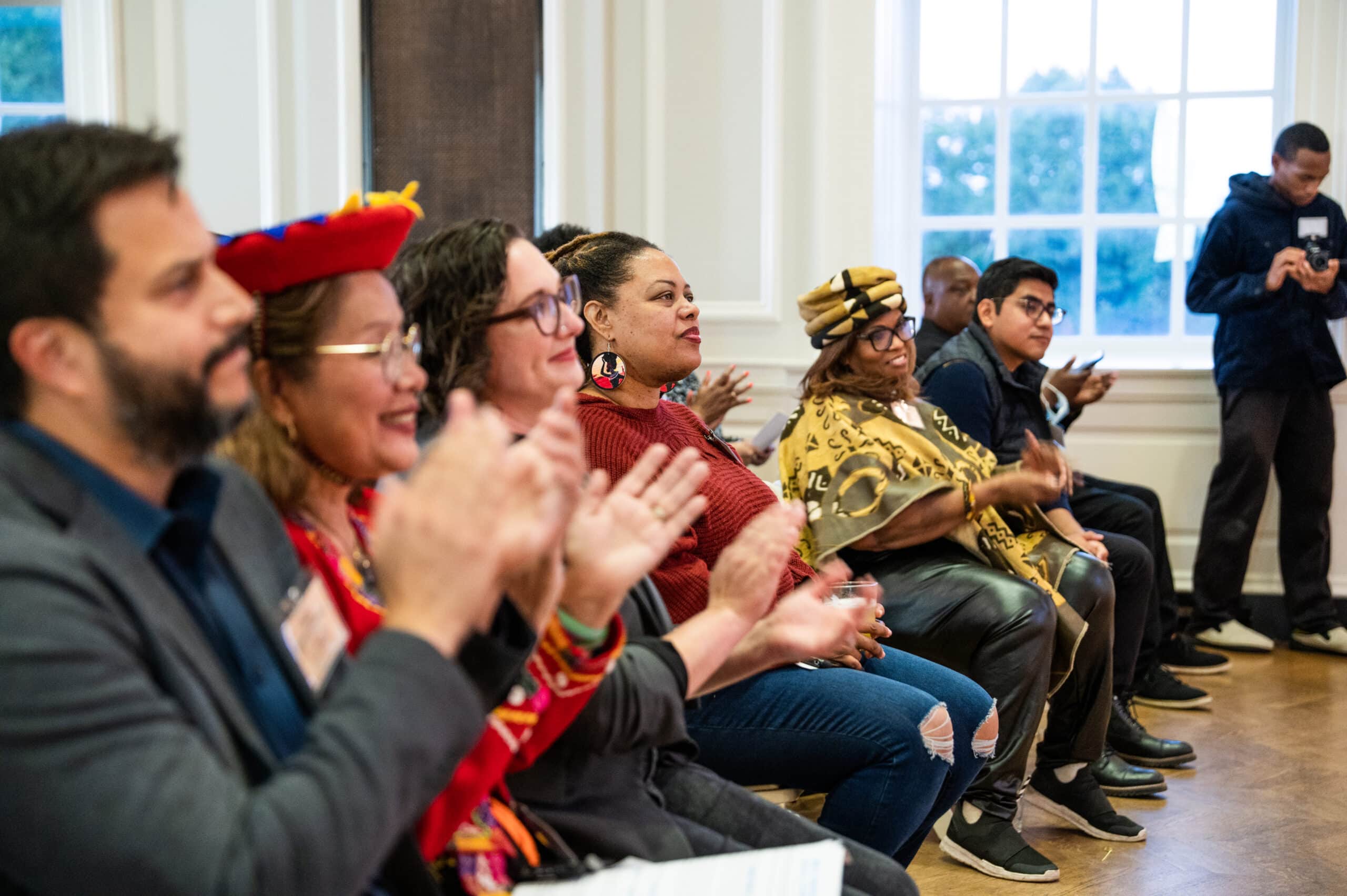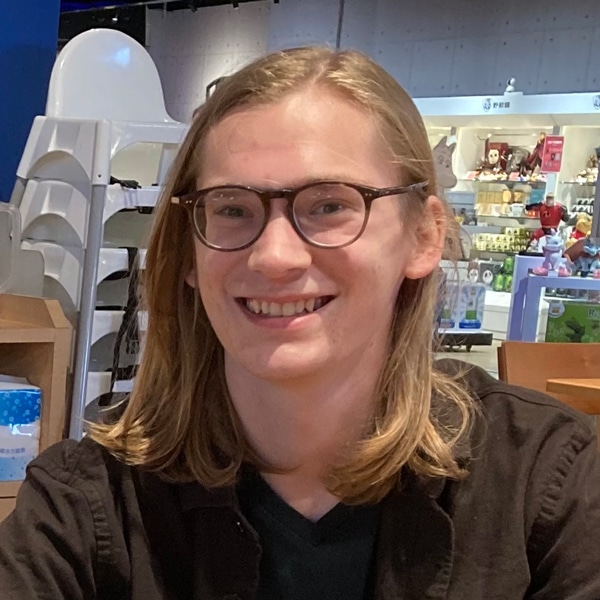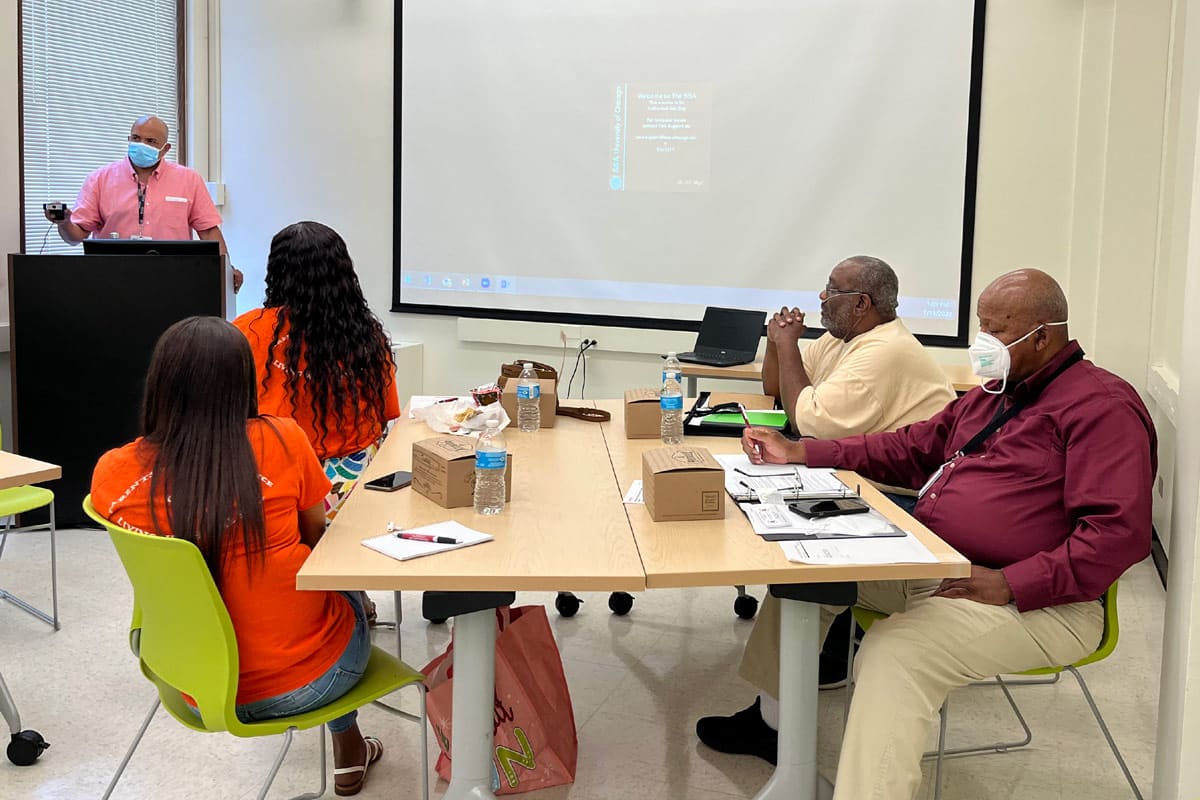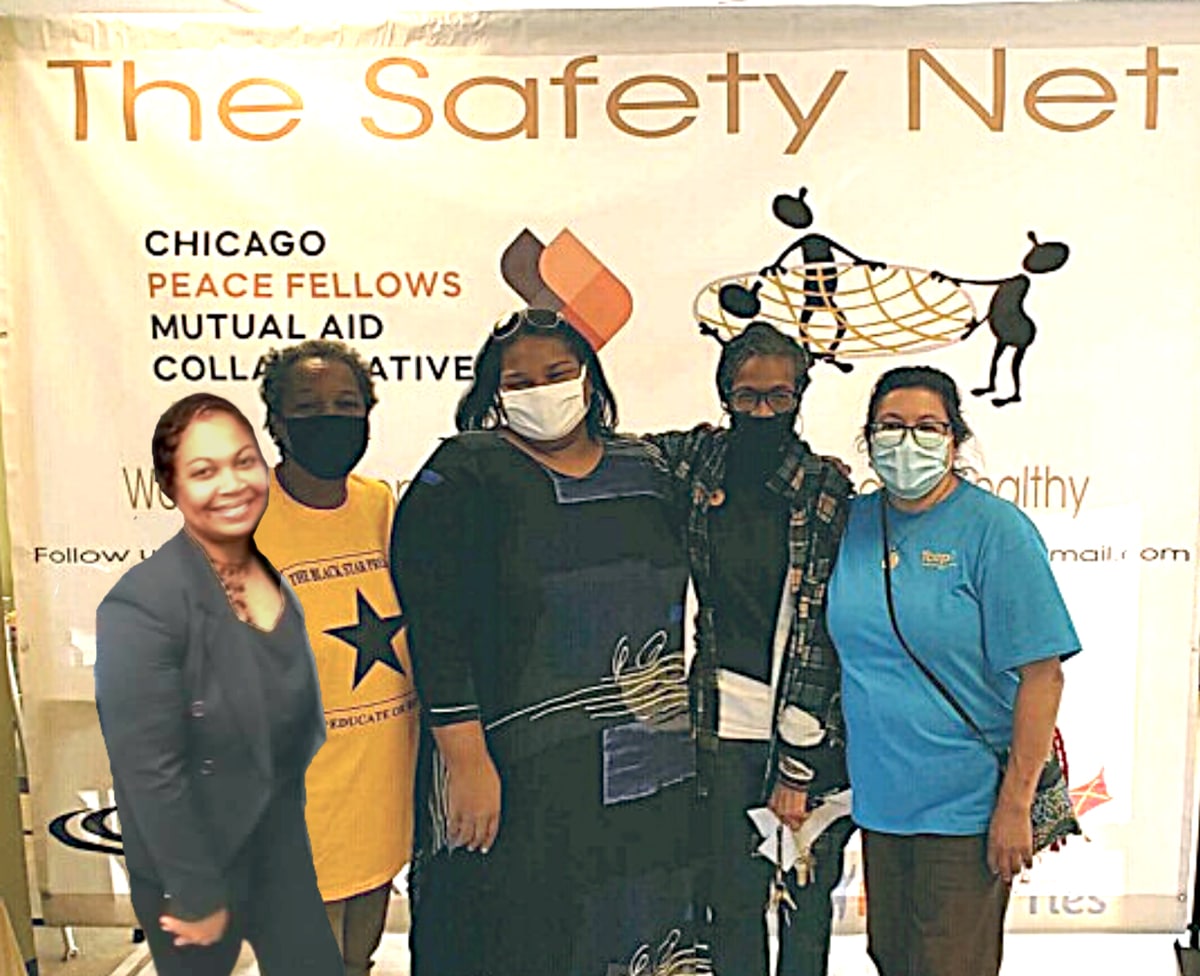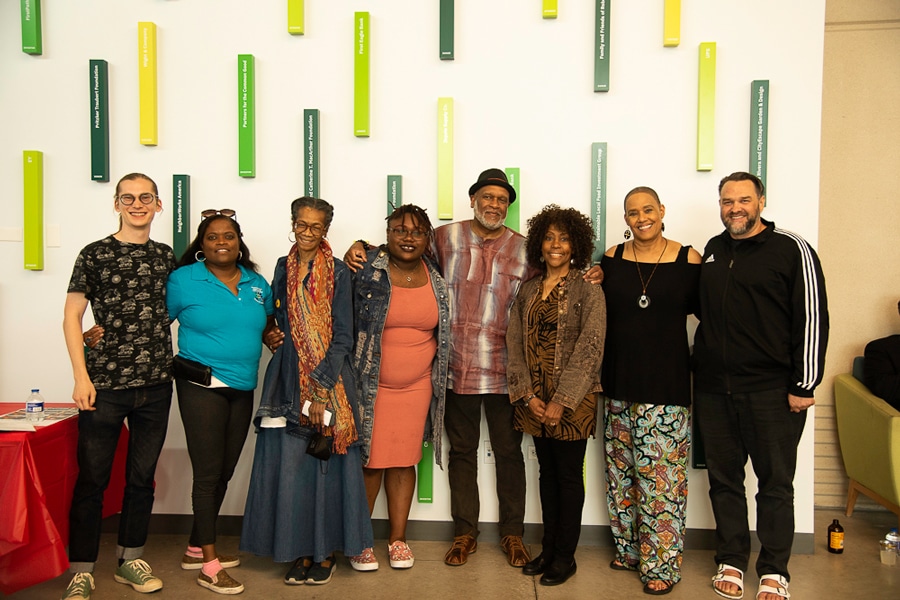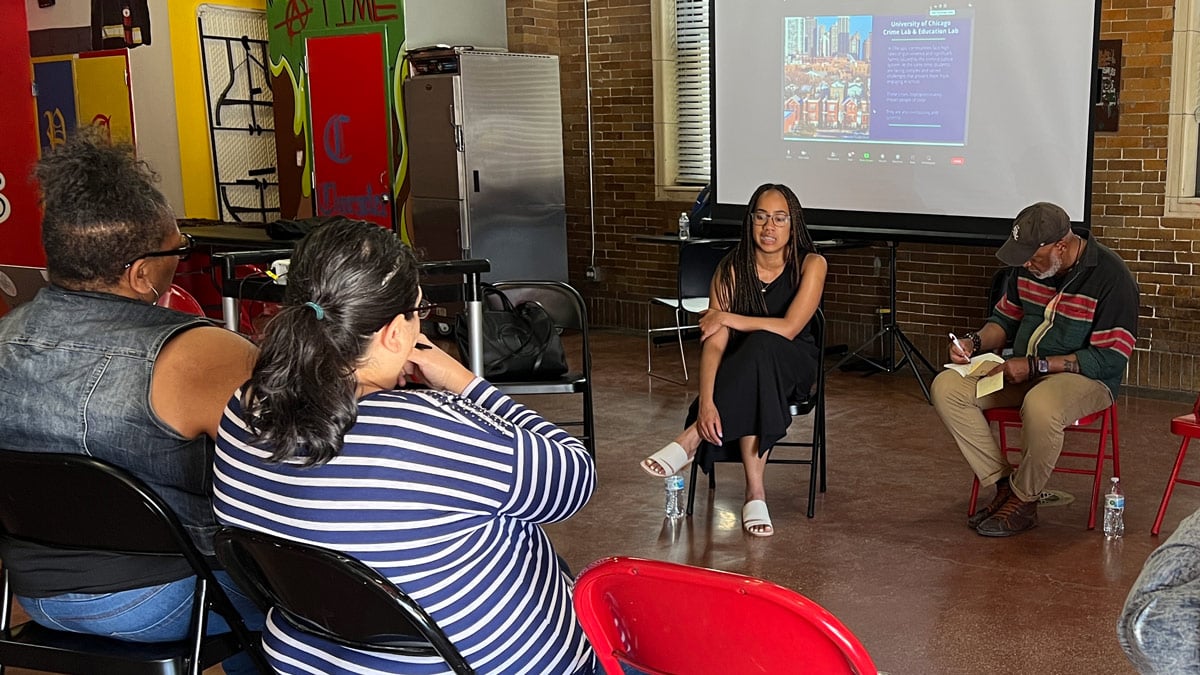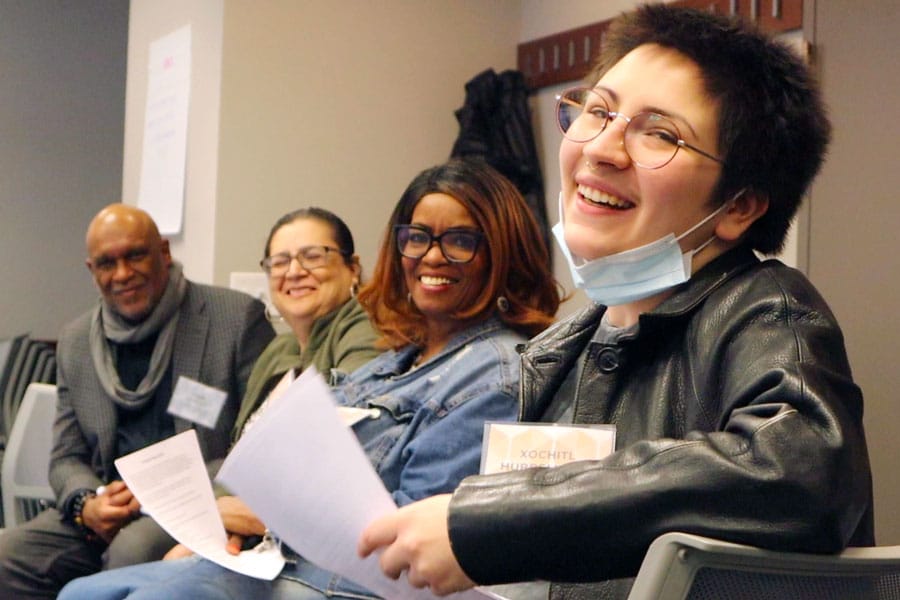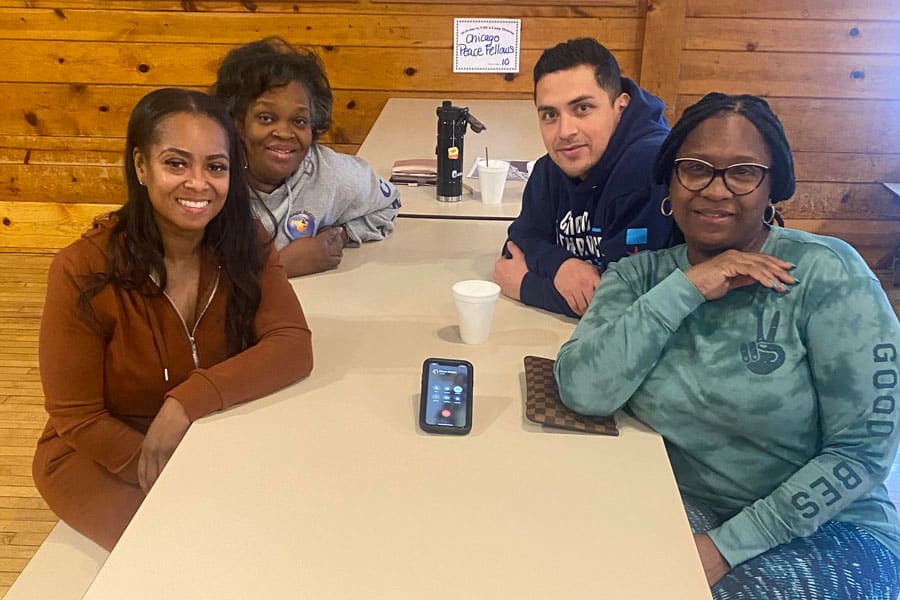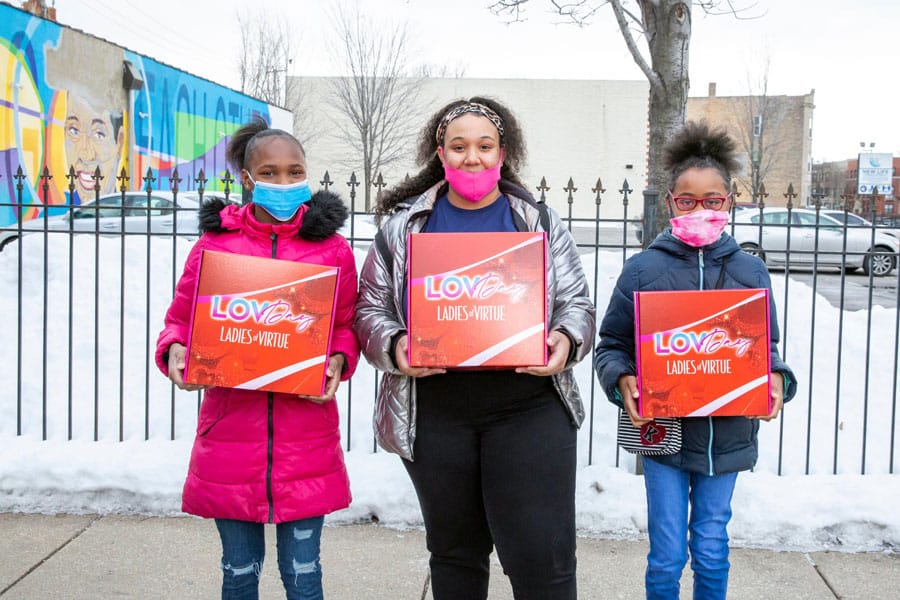Celebrating the 2022 Chicago Peace Fellows Graduation
By Jamika Smith, Tina Gulley-Augustus, Don Williams, Jacqueline Williams, and Cree Noble
On September 29th, 2022, 14 grassroots leaders from across Chicago gathered at the Chicago History Museum to celebrate their achievements as the fourth cohort to graduate in the Chicago Peace Fellows program.
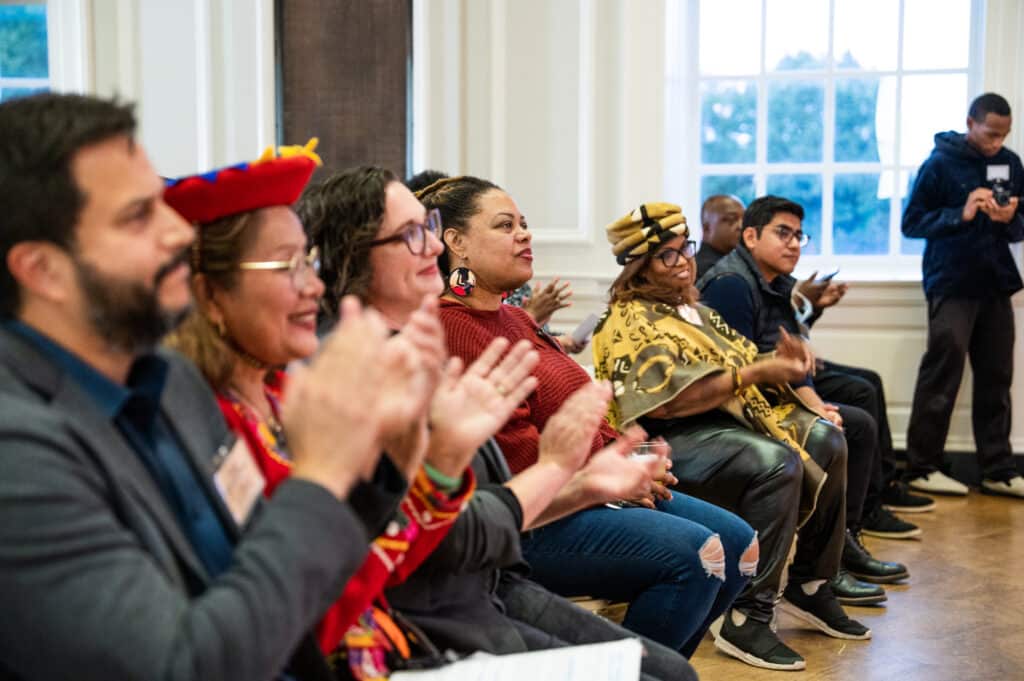
The Chicago Peace Fellows (CPF) program spanned over six months with over 25 workshops, partnership meetings, and discussions that helped Peace Fellows to deepen their shared understanding of grassroots leadership, violence prevention and community driven social change.
“Some of the greatest learning experiences were the collaboration of the Peace Fellows in developing community asset maps and recognizing how rich our communities look when we viewed them from an asset standpoint instead of a deficit. Our communities are so rich in knowledge, resources, and talents.” -- Tina Gulley Augustus, 2022 Chicago Peace Fellow
This was the second year that the Chicago Peace Fellows Graduation was hosted at the Chicago History Museum. The space was filled with laughter, cocktails, hors d'oeuvres, and music by a performance from a youth band from Segundo Ruiz Belvis Cultural Center playing Caribbean Jazz. The balcony gallery, just before you enter the great hall, was lined with pictures of the 2022 Peace Fellows. The gallery is named after the late Mrs. Josephine Baskin Minow, a community organizer, and advocate, who fought for many years for social justice and equal rights, to improve the quality of life for others much like the Chicago Peace Fellows.
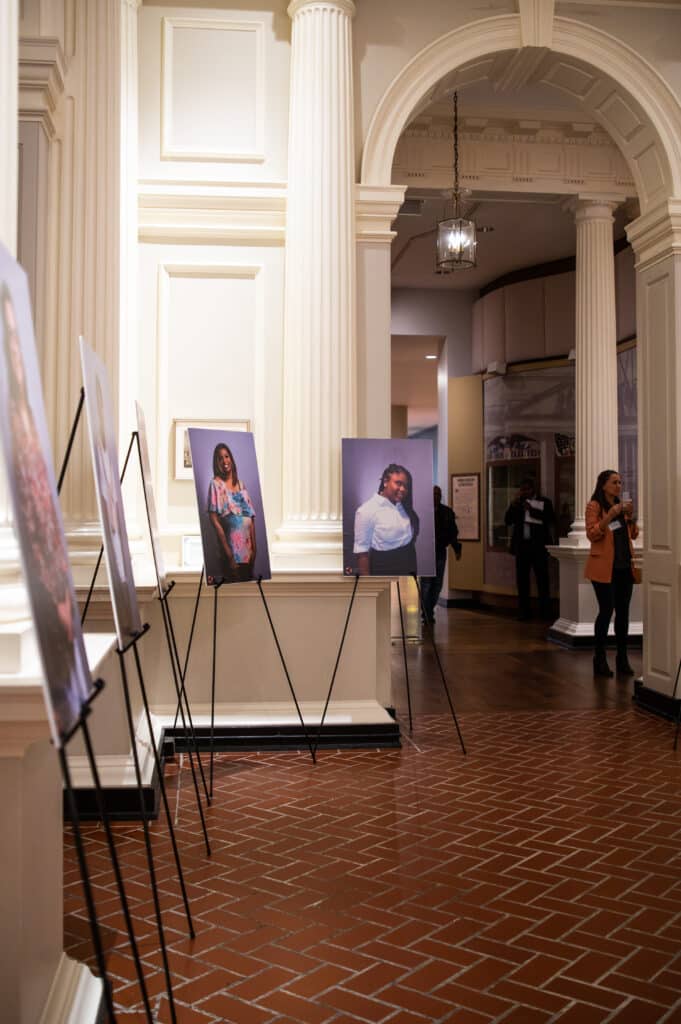
The graduation program was created by the Fellows to highlight their experiences, learnings and accomplishments. They incorporated personal testimonies, group facilitation, spoken word, asset mapping, and interactive programs into the design of the agenda. These activities were chosen due to the influence they had on each Fellow and how they allowed us to connect to our communities, family, and friends who were all in attendance at the graduation ceremony.
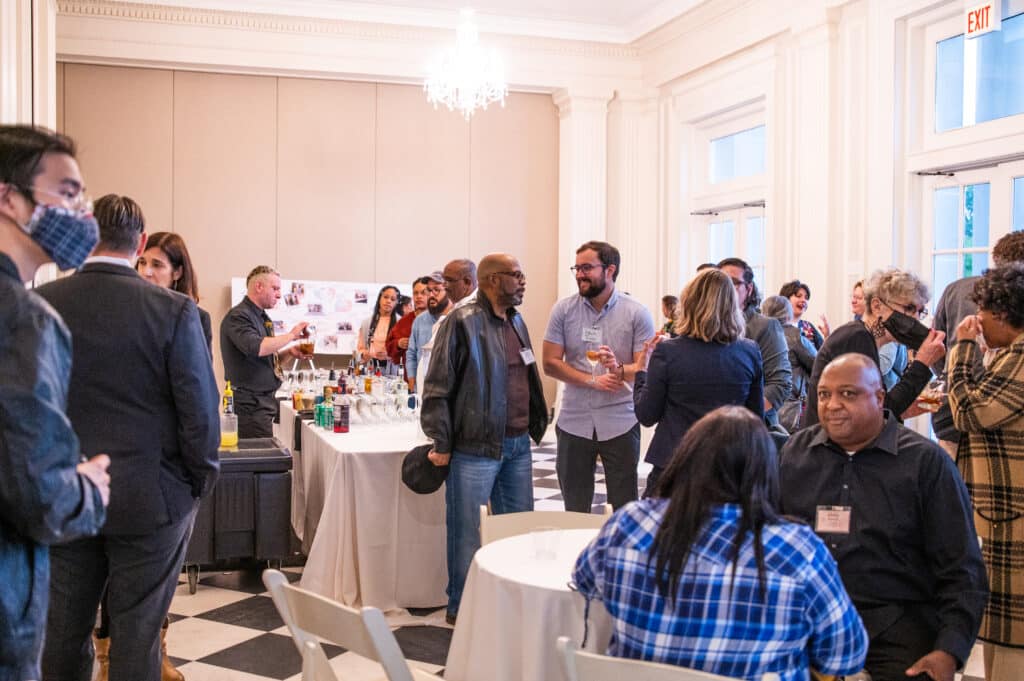
The ceremony began with a welcome remark from the Director of the Chicago Peace Fellows, Burrell Poe, who spoke about the impressive effort, work and conversations this group of fourteen leaders had undertaken over the past five months. Following Burrell, Fellow Lindsey Joyce opened the space with a prayer and reflection. After this opening reflection, Chicago poet Brynn Baltimore offered a powerful spoken word piece performance. The fourth speaker was CPF Don Williams, who provided a personal testimony about the loss of his son and how he had turned pain into purpose.
“My tribute to my son Deon J. Williams left me with a lot of mixed emotions about March 9, 2019… getting up there speaking about it brings some comfort and steps of me getting some closure. Deon was my baby. I wish things would have been different that day and that he would still be here. But that is why I started the Deon J. Williams Foundation, so that I could bring some awareness to juvenile law to change. I want to give a special thanks to my newfound family, the Peace Fellows. Thanks for allowing me to share my story. I hope I can impact someone.” - Don Williams (2022 Chicago Peace Fellows)
After Don’s powerful testimony, all 2022 CPF joined on stage to introduce themselves and the community they serve, and answer the question: “If violence disappeared tomorrow, what would be possible in my neighborhood?”, group presentation which was led by 2022 CPF Syliva Del Raso. Once the Fellows had shared their answers, they invited the audience to contribute to the question by writing it on a sticky note and placing it on a poster board.
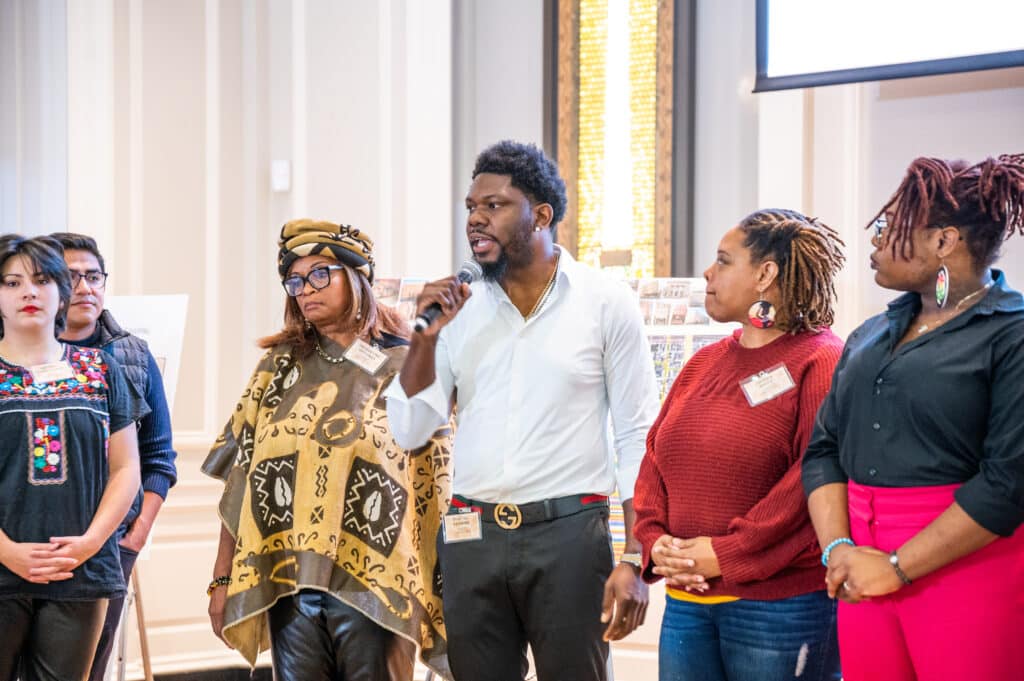
The second part of the ceremony was an explanation and presentation of what asset maps were. Fellows presenting their asset maps included Maria Pike (representing Pilsen), Edwin Martinez, and Sylvia Del Raso (representing Little Village), and Jackie Williams, Jamika Smith, Xochtil Hubbell-Fox, and Tina Gulley-Augustus (representing Austin).
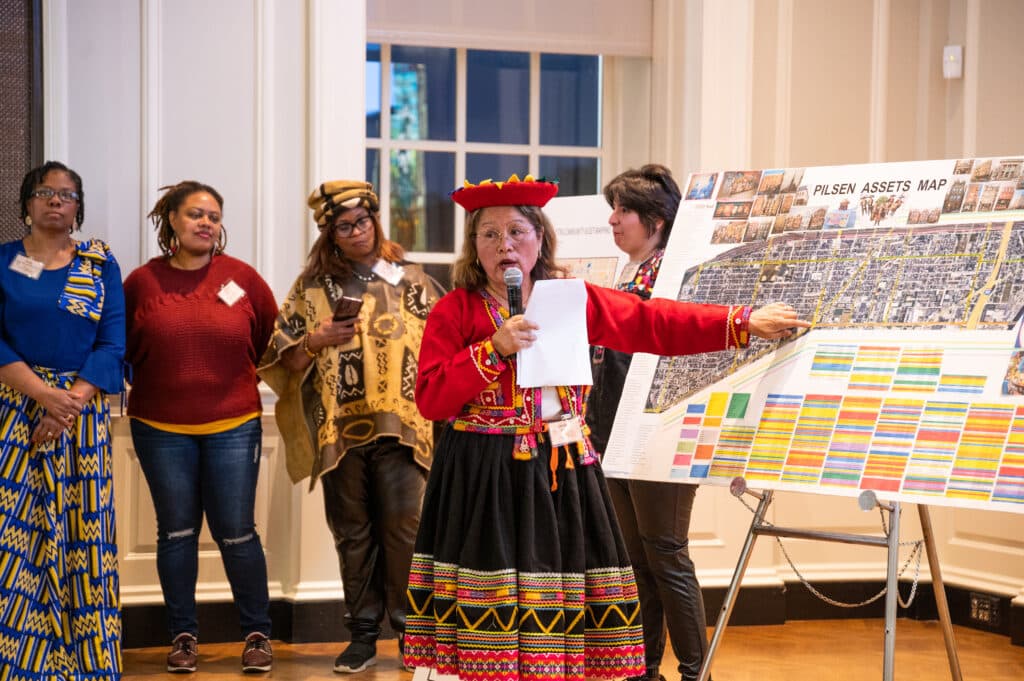
Then CPF Pha’Tal Perkins and CPF Edwin Martinez made closing reflections on what they hope to accomplish as they put their new learnings into practice. Lastly, Jamika Smith unveiled a project she wanted to gift to the 2022 Chicago Peace Fellows.
"Because I gained so much from the overall experience, my Spirit moved me to return the favor by sharing with my cohort and the Goldin Institute leadership a little piece of my heart. I took a skilled craft that has been around since the Middle Ages and I metaphorized it -- did I just make up a word? My cohort and I took an old worn-out chair and told our story, addressing the question “If violence disappeared tomorrow, what would be possible in my neighborhood?” One by one, we discussed the challenges, barriers, and limited beliefs our neighborhoods are struggling with today. Next, I asked them to share with me, if violence was rid from our communities tomorrow how would you feel? And what image and color will represent that feeling for you? After gathering all 18 responses I incorporated them into a design that represented the voices of our 2022 Chicago Peace Fellows. Our Peace Chair will always be an attribute of our journey together. My goal is to take our peace chair on tour in 2023, giving each Peace Fellow the opportunity to house it for a period of time in their organization, as a reminder that we are all connected and still have work to do…Together!” - Jamika Smith (2022 Chicago Peace Fellow).
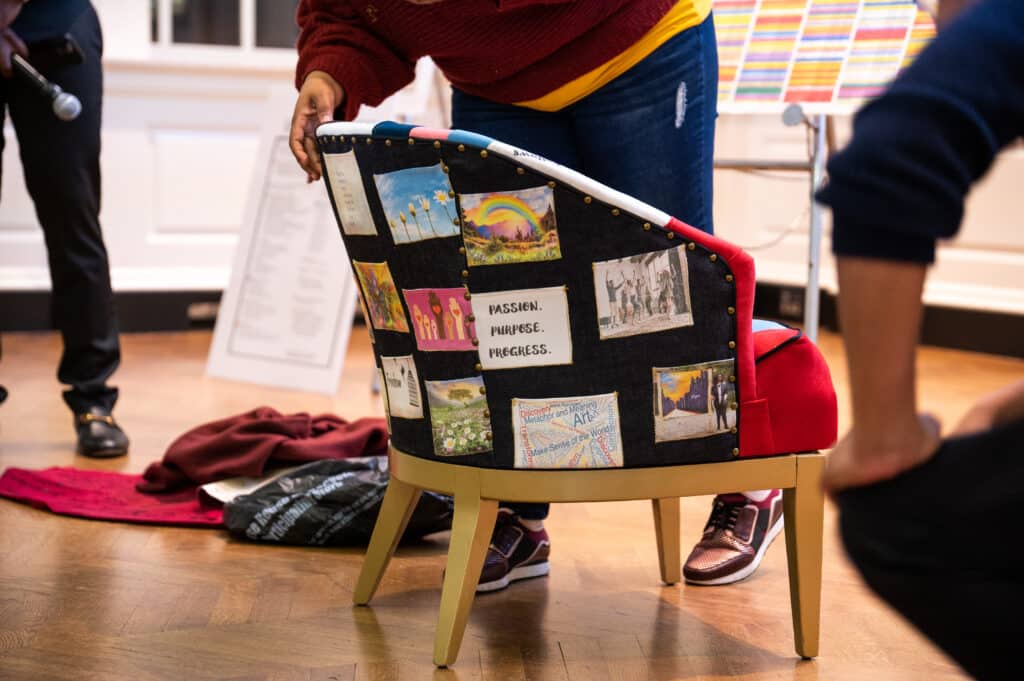
Upon graduation, the 2022 Chicago Peace Fellows now join the Goldin Institute’s Global Alumni Network which consists of over 150 Fellows from over 40 countries around the world. 2022 Chicago Peace Fellows Jacqueline Williams says “I plan to continue to stay in touch with as many people as possible. I have really enjoyed talking and connecting with everyone!
A December To Remember: Mutual Aid Collaborative Organizes a Toy Drive
By Michael Henderson, Director, Mutual Aid Collaborative
Juliet Jones, a 2021 Chicago Peace Fellow Alumni and the Co-Founder and Director of The Original Sixty Fourth Street Drummers, Inc. “wanted to bring children back to play” due to the set back and effects COVID-19 had on kids during the holidays. She thought holding a toy drive to benefit children in under-served communities would be a good way of accomplishing this goal.
Juliet, passionate about making a difference for children, proposed The Universal Toy Drive to the Chicago Peace Fellows Mutual Aid Collaborative. The Mutual Aid Collaborative consists of 60 Black and Brown leaders and committed allies who live and work in the communities they serve on the South and West sides. They have raised over $100,000 to support several active projects, including The Universal Toy Drive.
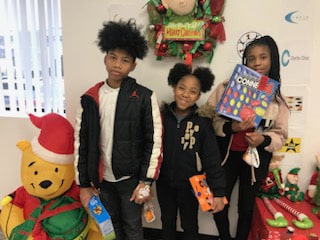
Juliet organized the Universal Toy Drive along with Dr. White, the TEECH Foundation, Clarity Clinic and Bethany Union Church to bring toys to disadvantaged children on the Southside of Chicago. Members from The Mutual Aid Collaborative, including Cosette Nazon-Wilburn of the LUV Institute, Jamila Trimuel of Ladies of Virtue, Gloria Smith of the Black Star Project, and Margaret Murphy-Webb of the Southside Jazz Coalition, all came together as a community to support Juliet. These leaders organized quickly by sharing flyers, sending and processing invitations, and reaching out to their network of parents.
On December 21, 2022, the Universal Toy Drive became a safe space for 113 children to play and receive gifts. The Universal Toy Drive was more than just giving toys away. Juliet knew the children who would be at the toy drive “normally missed out on a lot of things, not just toys, toys were the medium.” It was the intent of Juliet and the Mutual Aid Collaborative to bring joy to the lives of the under-served children and provide them with an opportunity to be kids.
Juliet was overwhelmed with joy as she got an opportunity to witness a village of children from a variety of places. Families who are dealing with HIV, children from the foster care system, children whose parents are incarcerated or in recovery, and other children from the community received all sorts of different toys, gift cards, coats, and other bags of goodies.
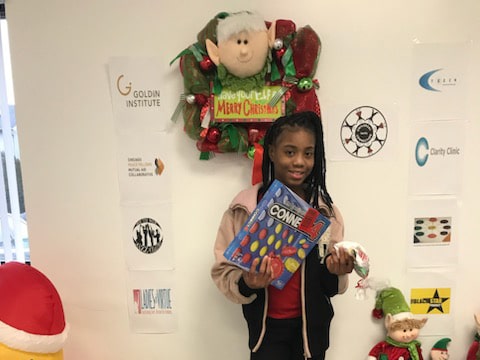
The 113 guests with their families that attended The Universal Toy Drive played board and video games, watched YouTube videos, played hopscotch and jump rope. They drank apple cider, hot chocolate, ate cookies and took pictures with Santa. The energy in the room was so amazing and filled with joy that the children received their gifts but, “didn't leave, they stayed and played, it was great”.
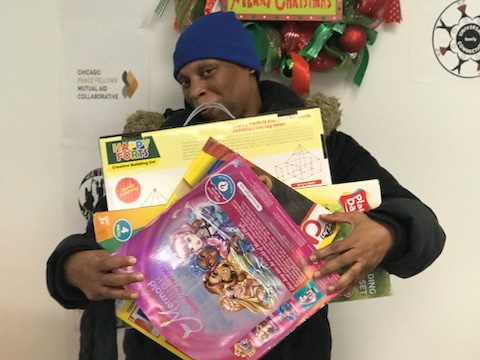
The collaborative efforts to touch the lives of children went beyond the imagination of Juliet’s and the village of local leaders. The Universal Toy Drive was a great success, providing 113 children with toys and gifting additional toys to The Universal Family Connection to use in their playroom for foster children. Juliet is ready for 2023 and has plans to continue to collaborate and organize with other community organizations to hold another Universal Toy Drive.
Generation Now Helps Teens Produce New Talk Show
By Zeki Salah, Facilitator, Mutual Aid Collaborative
The Chicago Peace Fellows Mutual Aid Collaborative is introducing teenagers to work in the media industry through a project called Generation NOW. Generation NOW was conceived by Messiah Equiano, a 2021 Chicago Peace Fellow, and aims to provide opportunities for young people to work on a teen talk show that addresses everyday issues that teenagers face. The program pays teenagers to produce, direct, and act in the show and provides them with a safe environment to express their thoughts.
Messiah originally thought of the idea of a teen talk show in 2014 and pitched the idea to the television station WCIU. The project was initially based on a show that appeared on BET in the 90s and early 2000s called Teen Summit. Teen Summit provided a platform for teenagers to talk about the everyday issues they face and brought these issues into perspective within an open and safe environment. Messiah thought the idea of a teen talk show was valuable and conceptualized Generation NOW as a similar program that would also allow the young people to get involved in aspects of production.
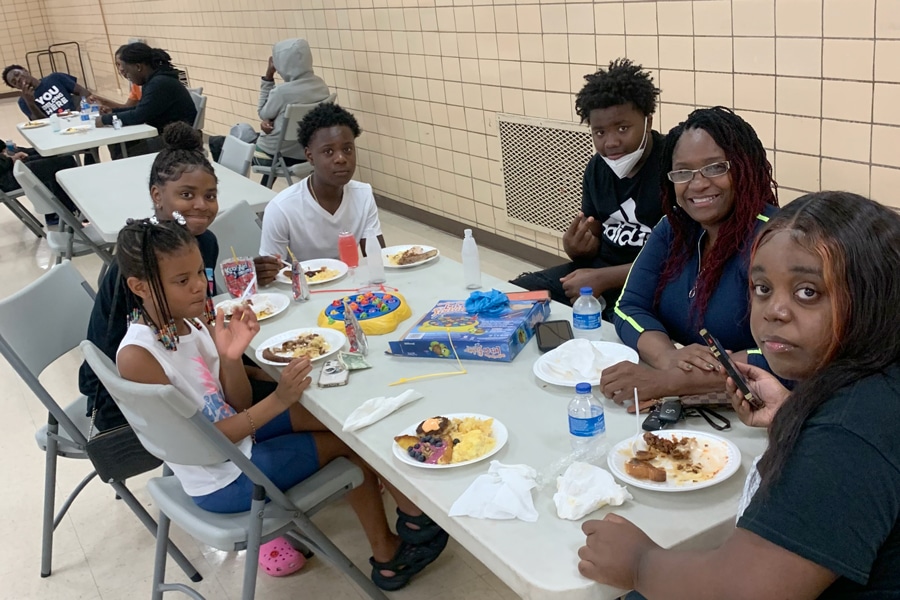
While the station turned down the pitch, Messiah persisted and applied for a grant from the Chicago Community trust to shoot a pilot episode of Generation NOW. He received the grant from the Chicago Community Trust in 2019 and filmed the pilot at Lawndale Community Academy. This experience showed him how therapeutic and empowering a platform for teens to express their issues could be. Since then, he has been working to secure funding to film more episodes of Generation NOW, including the August 5 filming that was funded by the Mutual Aid Collaborative.
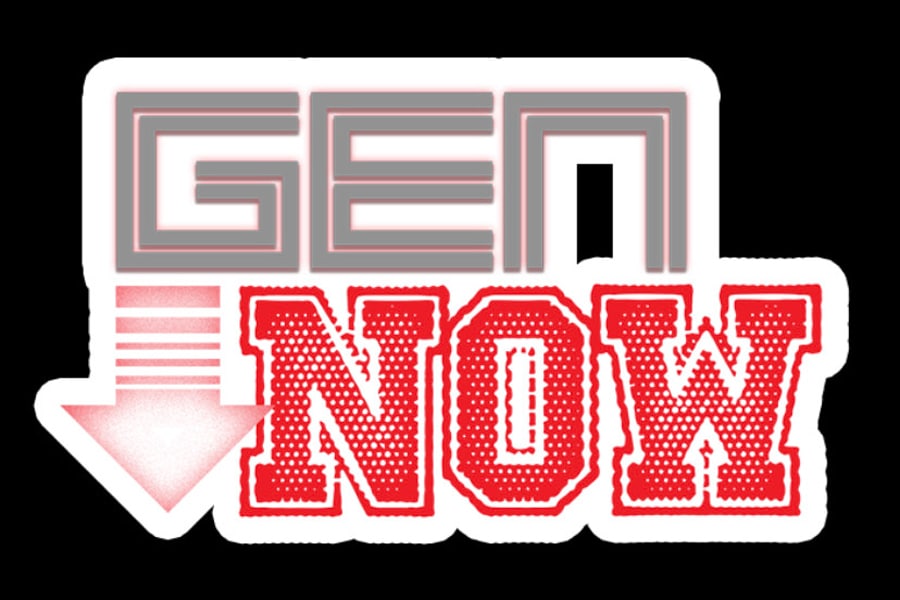
The Mutual Aid Collaborative is made up of 60 Black and Brown leaders and committed allies who live and work in the communities they serve on the South and West sides. They have raised over $86,000 to support several active projects, including Generation NOW. The Mutual Aid Collaborative met and collaboratively voted in May to provide Generation NOW with the funding to film another episode at the Foster Park District.
Generation NOW aims to provide young people with a setting to be open about their opinions, while also providing them with experience with different aspects of television production. Teens are invited to work on the project as writers, production members, or actors and are compensated for their work. On August 5th, the funds provided by the Mutual Aid Collaborative were used to pay 10 teenagers $250 each for their involvement in a day of filming. Funds were also used to provide them with meals and entertainment and also paid for a camera crew. Generation NOW aimed to provide the teens involved with a new opportunity to express themselves without judgment.
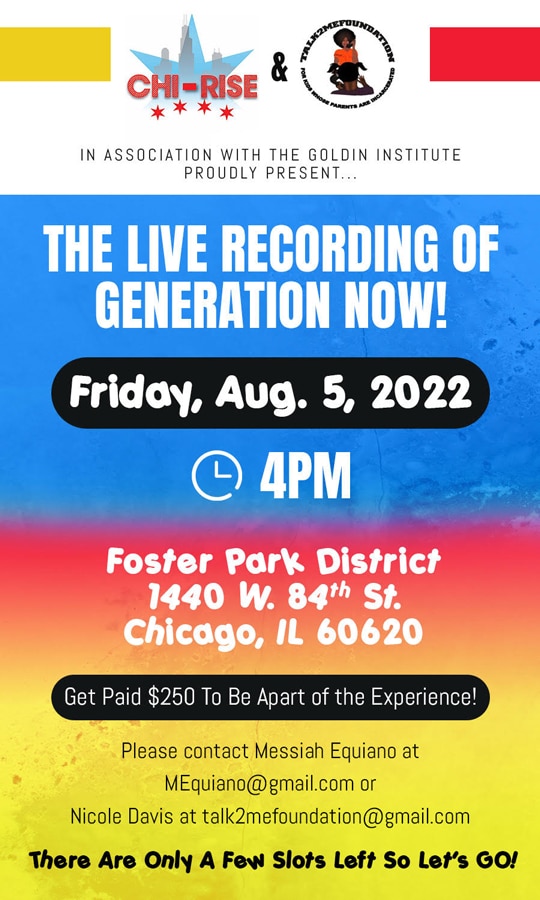
The young people were not only provided with food and time to get to know each other, but they were also told not to laugh at each other or dismiss opinions and were assured that the raw footage from the filming would not become publicly available.
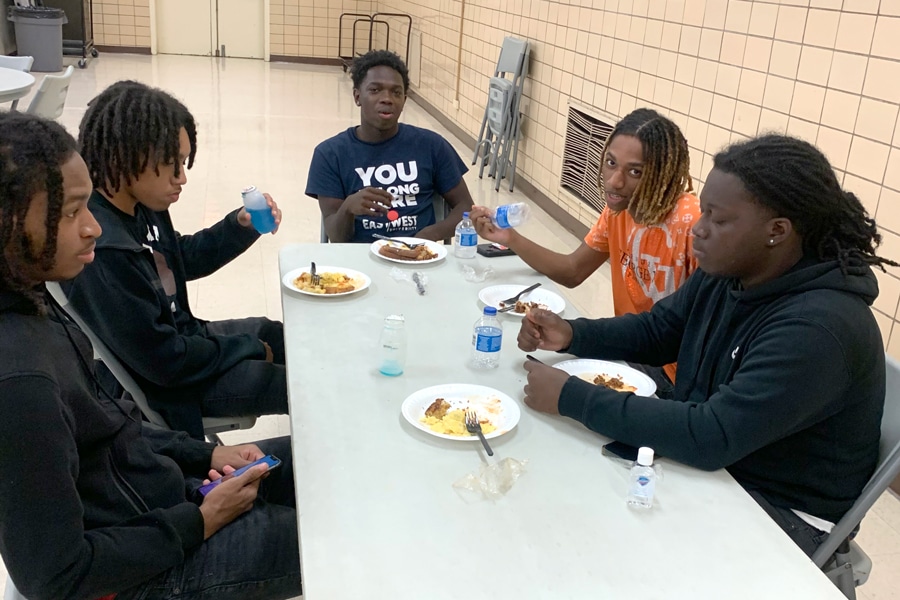
The filming of Generation NOW on August 5 was a collaborative effort between Peace Fellows. Alongside Messiah, Nicole Davis and the Talk to Me Foundation brought in actors and rehearsed together. As part of the filming, Nicole and her teens performed a skit where a woman accuses a man of stealing her purse, he denies stealing her purse, and she comes back with her brother to confront the accused man. At the end of the skit, someone approaches the woman and informs her that she left her purse in the bathroom and she apologizes. This scene was modeled after the experiences of the teens themselves, who gave input on how the scene might unfold.
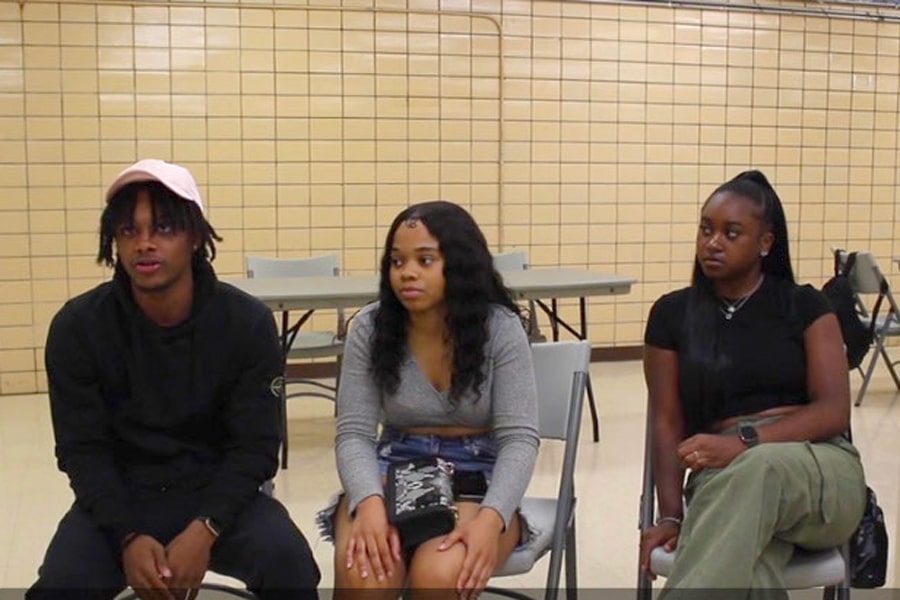
While Nicole led the rehearsal, the script of the conflict and resolution was developed by the teens. For instance, when asked what they would do if confronted about stealing, all of the young men at the filming responded that they would stand their ground during the confrontation and would not run away. The filming not only provided the teens involved with a platform to voice their beliefs without judgment, but also with a chance to enact their visions in a production and to work together collaboratively.
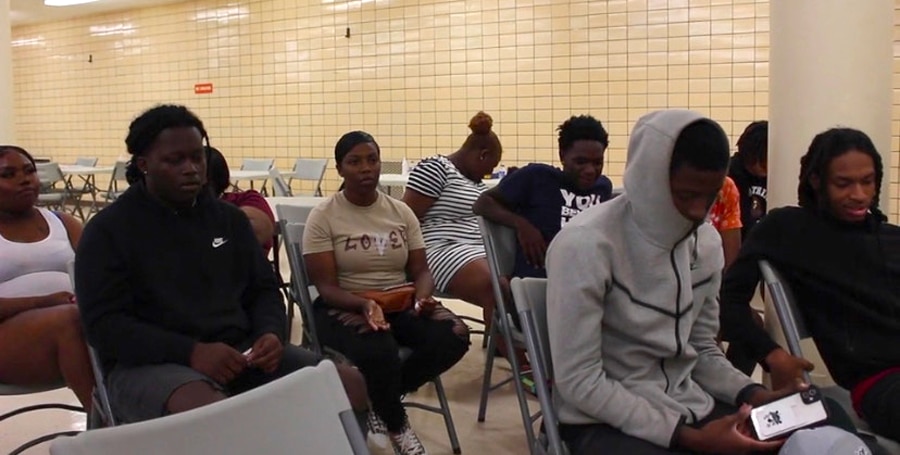
The response of the young people involved in Generation NOW has shown that the program is both therapeutic and empowering. Messiah spoke to the experience of the teens involved as they were provided with a platform to speak about topics like dating and conflict resolution: “Human beings hold onto so much in their hearts and their minds related to their experiences... Even if someone doesn’t express themself, just hearing another person make themselves available can make them feel better.” By continuing to provide this platform for teens and compensating them for their involvement, Messiah believes he can first them away from activities that might lead to violence:
[Generation NOW is about] getting a gun from someone’s hand and a camera into it. I’ve seen this in real life, I’ve seen people love it... you put a camera in his hand and he loves it. You’ve got to give them alternatives and have them get paid for it.”
Messiah’s organization, CHI-RISE, is looking for funding to continue to produce episodes of Generation NOW. They are also looking towards expanding the programs to different communities, and looking specifically at communities with higher risks of violence. Through community collaboration, they are hoping to help teenagers find work on the project during summer and winter recesses from school. Ultimately Messiah hopes to create a sustainable model for Generation NOW by getting members of the community involved and having them watch the show. Through creating content that gives back, Generation NOW aims to create safer and more connected communities.
Mutual Aid Collaborative Builds Connections with UChicago Medicine Violence Recovery Program
By Zeki Salah, Facilitator, Mutual Aid Collaborative
On Tuesday, July 19th, Peace Fellows and members of the community met with University of Chicago Medicine’s Violence Recovery Program (VRP). The event was held as part of the Mutual Aid Collaborative’s Civic Leader series, which aims to build connections between individuals and organizations that work to build peace and prevent violence. At their meeting, Peace Fellows spoke with Dr. Franklin Cosey-Gay, the Director of the VRP as well as Carlos Roble, a Clinical Lead/Social Worker in the VRP. Fellows learned about what the hospital does for victims of intentional violence as well as some of the root causes of violence that the Violence Recovery team hope to address.

Dr. Cosey-Gay walked Peace Fellows through the history of the Violence Recovery Program at the University of Chicago Medical Center and began by discussing the structural issues that the Program was designed to address. The VRP was started in 2018, with only two violence recovery specialists involved. The trauma center was created to provide more equitable access to high-quality health care and trauma treatment services on Chicago's South Side, specifically neighborhoods impacted by systemic violence. The VRP team views violence through a public health lens, which aims to address structural causes of violence, rather than blaming the individual. Because of this, the VRP seeks to make adjustments to the medical system that provide services to individuals affected by violence to promote equity and reduce the outbreak of further violence.

The Violence Recovery Team stressed that their framework of understanding violence through a public health framework goes beyond understanding treatment and rehabilitation on an individual level but also aims to prevent violence through examining relational, communal, and societal factors. Their presentation focused on why there are higher risk factors of violence on the Southside and particularly in predominantly Black neighborhoods. Chicago has a history of racial tensions that developed over time through restrictive covenants, redlining, urban renewal projects, and policing. These structural forces have deeply impacted South Side communities and the VRP is hoping to rebuild trust in public health institutions by gaining credibility and working with community based organizations. Meeting with Peace Fellows and members of the community acted as a way for the VRP to continue building credibility with organizations that work in violence prevention so that they can collaborate to address violence as a public health concern.
The Violence Recovery Program also operates on an individual level, acting to protect victims of violence and their families from disruptions that can be physically or emotionally harmful.
"Violence Recovery is about public health. We don't focus on fault or blame, we focus on prevention." -- Dr. Cosey-Gay
Dr. Cosey-Gay emphasized since the role of the Violence Recovery team is to act as public health professionals, they “neither determine fault nor place blame, but focus on prevention.” Oftentimes, social workers in the VRP act to keep police away from victims of violence so that they have time and space to heal and are given time to recover before questioning. Carlos Robles, a social worker in the VRP noted:
“We don't want to treat victims of violence as criminals, but as experts in their own lives.”

Today the Violence Recovery Program at University of Chicago Medicine has 15 full-time employees and offers 24-hour care to victims of intentional violence. Their care extends outside of the hospital as they also help patients and families navigate external health care and social services. As Peace Fellows and community members got to know the services of the VRP, they were surprised at the amount the program has grown in the last four years. Many of the attendees shared their own experiences navigating hospitals alongside victims of intentional violence and welcomed the new approach to violence recovery offered by the program. One attendee told a story about how she was not offered an opportunity to see her son’s body after he was the victim of violence and emphasized how traumatic this experience was for her. If a violence recovery program had been in place, some of the trauma of this experience could have been avoided and more trust could have been built between the hospital and the community.

Getting to know the services and history of the Violence Prevention Program helped Peace Fellows and community members build a mutually beneficial relationship with the hospital. By gaining connections to community-based organizations the VRP builds credibility and gains new resources to direct victims of violence to with the aim of preventing further violence. Members of the community similarly benefited from learning about how approaches to treating intentional violence have improved over time and from gaining a better understanding of how the trauma center could treat members of their communities. Through this meeting, Peace Fellows gained new opportunities for collaborations that have the potential to bring lasting peace to their communities.
Safety Net Launches Blood Drive
By Zeki Salah, Facilitator, Mutual Aid Collaborative
Chicago Peace Fellows are working to address an increased demand for blood from Black and Brown donors through holding a Mutual Aid Collaborative Blood Drive. The Blood Drive is part of an ongoing Safety Net project by the Chicago Peace Fellows Mutual Aid Collaborative, a group of 60 Black and Brown leaders and committed allies who live and work in the communities they serve on the South and West sides. Fellows working on the Safety Net project seek to address multiple pandemics that ail the South and West Sides of Chicago, including COVID-19 and community violence.

The Safety Net campaign is accepting donation pledges until June 28th, but you can donate at any time after making the pledge. You can sign up for the Safety Net team’s blood drive here: https://sleevesup.redcrossblood.org/campaign/give-from-the-heart/
You can also promote the blood drive by using the hashtag: #OurBloodMatters
The Safety Net project started at the height of the COVID-19 pandemic by creating a distributed network of PPE providers throughout a grassroots network, but has since expanded its scope to include broader public health issues. Since its inception, the Safety Net project has also held COVID vaccine clinics to address the disproportionate impact of COVID-19 on Black and Brown communities. The Chicago Peace Fellows Blood Drive is the latest project by the Safety Net team and seeks to address a shortage of Black and Brown blood donors.

More Black and Brown donors are needed in the United States because of a rise in demand for some rare blood types that are more common in people of Black heritage. Certain subtypes of blood need to be matched to treat blood diseases such as sickle cell anemia. Blood donors are screened to see if they might possess certain rare blood types, which can also help match plasma and bone marrow donors. The demand for blood that the Safety Net team seeks to address is expected to increase even more during the summer, due to the increase of accidents such as car crashes and fireworks, as well as spikes in cycles of gun violence. This can put patients who need blood in consistent quantities at risk as these sorts of incidents risk depleting the blood reservoir that their treatments draw from.
The Safety Net wanted to bring attention to the need for a more diverse blood bank after learning that the director of the Chicago Peace Fellows, Burrell Poe, was diagnosed with aplastic anemia. Treatment for aplastic anemia requires bone marrow transplants, which can only be performed if the donor and recipient have matching subtypes of blood. In solidarity with Burrell, the Safety Net team scheduled their Blood Drive around his birthday, so that members of the community could be made aware of the importance of blood donations and their potential to transform the lives of other people.

Jacquelyn Moore of the Safety Net team donated blood in response to the blood drive and found the experience to be fulfilling as an altruistic act, while also gaining new insights into her own health. Jackie was touched by the campaign on a personal level because a blood drive saved her husband’s life after it connected him with a match for a stem cell transplant. She stated “giving blood provides a way to directly help the community and provides people with an opportunity to act, to improve the lives of people around them.” Additionally, Jackie noted the pragmatic benefits donors receive when giving blood. After giving blood, she was contacted by the Red Cross and given a report of her COVID-19 antibodies. She noted that the Red Cross also provides other reports on other aspects of the health of its donors and can act as a free health screening. At the screening, vital signs are checked and problems such as high blood pressure, arrhythmia, or low hemoglobin levels can be detected.
The Safety Net team’s blood drive campaign also seeks to dismiss myths about giving blood. They assert that giving blood is not painful, and can even be relaxing as it gives the donor an opportunity to sit back and take a break from the hustle and bustle of the day. Additionally, the Safety Net encourages members of the LGBTQ+ community to explore the possibility of giving blood, because many of the previous restrictions against donors within this community have been lifted. Lastly, the Safety Net team emphasizes the safety of giving blood, donation centers undergo strict COVID precautions and there is a low risk of contracting COVID while giving blood.
Second Annual Chicago Peace Fellows Music Festival
By Zeki Salah, Mutual Aid Collaborative Facilitator
The Chicago Peace Fellows held a Concert for Peace on June 4th, celebrating the artistic accomplishments of their communities and a shared commitment to improving their neighborhoods. The Second Annual Chicago Peace Fellows Music Festival was held at the Hatchery in Garfield Park with Peace Fellows gathering performers from across the city to play music, sing songs, read poetry, and dance. The Music Festival was organized by a committee within the Peace Fellows Mutual Aid Collaborative, a group of 60 Black and Brown leaders and committed allies who live and work in the communities they serve on the South and West sides.

The event was made streamed live on the Goldin Institute’s Facebook page where you can watch the recording.
The Music Festival Committee is made up of musicians and educators that have first hand experience with the transformative power of music and its positive impact on communities. The committee pooled their connections to create a lineup with a diversity of talents that represented neighborhoods across the city. The Peace Fellows Music Committee is made up of Peace Fellow Alumni from across the cohorts of 2019, 2020 and 2021: Gloria Smith of the Black Star Project, Angelina Zayas of the GAP Center, Juliet Jones of the Original 64th Street Beach Drummers, Margaret Murphy-Webb of the South Side Jazz Coalition, Marvinetta Penn of Global Girls, Inc., Rashada Dawan of B.Fli Productions, and Robin Cline of Neighborspace.

As musicians, artists, and educators, members of the committee had an eye for both talent and opportunity, bringing together talented members from their communities to perform. Many of the performers at the Peace Fellows Music Festival were young people for whom the festival provided an opportunity to gain experience performing, show off their talents, and be compensated for their time and effort. Additionally, by bringing together artists from across the city, the Peace Fellows Festival allowed for them to network with each other and collaborate in their artistic ventures.

The Peace Fellows Music Festival featured an eclectic range of performances, including jazz, hip hop, and classical music, as well as spoken word poetry and choreographed dances. Finding talent for the Festival was a collaborative effort, with multiple organizations spreading the word and connecting talent to the festival.
Performers included:
- Guru Tonic
- Heart Cry
- Kenya Braitwaite
- Mara Mitchell
- Global Girl Youth Company
- Phoenix
- The Original 64th Street Drummers
- Margaret Murphy-Webb
- MC Skool
- Ethan Clay
The Festival was held at the Hatchery, a non-profit food and beverage incubator which provided the space for free. While the Hatchery primarily serves to provide professional development to people in the food services industry, both the Hatchery and the Peace Fellows involved in the Festival have a common goal of connecting underserved communities with access to education, opportunity, and community resources.

The theme of peace was emphasized throughout the Festival as performers and organizers spoke to the importance of arts education, mutual aid, and community activism. Peace Fellows and their organizations were invited to set up tables and share information about their organizations for the first hour of the festival. This allowed for Fellows representing neighborhoods throughout Chicago to share resources with each other and network.

As the concert came to a close, 2020 Chicago Peace Fellow, Maragret Murphy-Webb, spoke to the importance of investing in arts education. She emphasized that the arts have the capacity to improve communities and combat violence: “If you put an instrument in a child’s hands, you can keep a gun out of their hands.” She encouraged audience members to engage with the City of Chicago and request more funding for arts and education in the South and West Sides so that underserved neighborhoods might have greater access to educational opportunities.

Through bringing together community members, providing them with opportunities, and affirming a collective commitment to peace through music and art, the Peace Fellows Music Festival sought to improve the communities represented by the Chicago Peace Fellows. Fellows’ commitment towards representing and improving their neighborhoods was pivotal to the Festival’s success.
Connecting Community Members with the Research of the University of Chicago Crime Lab
By Zeki Salah, Facilitator, Mutual Aid Collaborative
Chicago Peace Fellows hosted a conversation at the Firehouse Community Arts Center on June 3, 2022 to discuss community safety and crime data with the University of Chicago Crime Lab. The event was held as part of the Mutual Aid Collaborative’s Civic Leaders series, which is designed to connect alumni of the Chicago Peace Fellows with policy makers, academics, and community activists that are leading innovative work to promote community safety and prevent violence in their neighborhoods.

At this event, the Peace Fellows met with Kim Smith, the Crime Lab’s Director of Programs, to learn about data that the Crime Lab collects and how it has been used to shape policy decisions. Members of the Lawndale community also came to attend the presentation and learn about how they can engage with the Crime Lab’s research.

The Crime Lab’s presentation focused on the disproportionately high rate of gun violence in Chicago as well as the disproportionate impact of this violence on communities of color. In 2020, there was an increase in violence crimes, and homicides in particular, in Chicago. While other large cities such as Los Angeles and New York have lowered their homicide rates, Chicago’s rate of homicides has increased from 2010-2020. This violence also affects men of color more so than any other group: 80% of shooting victims in 2020 were Black and 86% were male. Black men also carry a dual burden of incarceration alongside gun violence victimization, with the percentage of Black men aged 20-24 being over five times greater than the percentage of white men of the same age group.

Peace Fellows, the Crime Lab, and other members of the community spent much of their time together talking about the causes of this disproportionate violence and potential solutions. The Crime Lab noted that the majority of homicides were not motivated by money, gang interests, or other instrumental purposes, but were spurred by personal altercations between individuals. Members of the community attributed some of the causes of the increase in violence to the way incarcerated people are rehabilitated and to increased absences in schools after the outbreak of the COVID-19 pandemic. Community members and Kim Smith of the Crime Lab mutually agreed that street outreach workers who work at personal level with community members are often successful in addressing these kinds of personal altercations and that there is a need for funding in this area.

Meeting together helped Peace Fellows build connections between their own experiences and the data captured by the Crime Lab. In their presentation, the Crime Lab showed that 16,000 children became disengaged during the pandemic. Pamela Montgomery-Bosley began working as a violence prevention manager with youth after her son was shot and killed and spoke to her experience working with children in unstable homes. She spoke to her experience seeing children struggle with their home lives while finding some stability at school, but noted that schools are now having difficulty keeping children in classrooms. Kim supported this argument by citing Crime Lab data that over one in nine children in options schools, which are largely composed of students who were previously disengaged from school, have been involved in violent incidents. She also noted the increased rate of victimization and arrests amongst option schools students.
Meeting with the Crime Lab showcased to Peace Fellows how data can give deeper insight into the disproportionate levels of violence in communities of color. Data can support personal experiences around issues such as violence and disengagement in school, giving them greater weight. This can enhance communications, donation campaigns, and grant proposals for grassroots organizations in need of resources. Kim encouraged Peace Fellows to request data from the Crime Lab to supplement their own work, noting that even if the Crime Lab does not have data around specific issues, a request could help direct future research.
The meeting between Peace Fellows and the Crime Lab worked to bridge the gap between the research of the Crime Lab and the members of the communities they study. Kim Smith noted that the Crime Lab often has difficulty connecting with grassroots leaders and sharing its data and that they are looking for ways to engage more with local communities. By connecting with the Peace Fellows, the Crime Lab will be able to better share its research and direct its focus towards interests that are guided by community input. This in turn will help the Crime Lab provide community members with a deeper understanding of the problems they are facing and offer potential solutions to the spread of violence.
2022 Chicago Peace Fellows Launched
On April 28, the 2022 cohort of the Chicago Peace Fellows met for the first time at the DePaul Center. The 2022 Peace Fellows cohort consists of activists, artists, social workers, and community leaders representing 14 community areas on the South and West sides of Chicago. Founded in 2019 in collaboration with the Partnership for Safe and Peaceful Communities, the Chicago Peace Fellows program is the only leadership development program that is built by and for grassroots community leaders on the South and West sides of Chicago.

The 2022 Peace Fellow Cohort will be the fourth group of Chicago Peace Fellows, following in the footsteps of over 60 alumni and joining a global network of Alumni featuring more than 100 grassroots leaders in over 30 countries. Pastor Reshorna, a 2021 Peace Fellow, spoke at the launch event and emphasized the value of the skills the Peace Fellows curriculum taught her. She spoke to the importance of learning an asset-based approach to community engagement:
"We had the opportunity to do asset mapping, to go out into our communities and see what was already there. Because most often, when we talk about our communities, people talk about what we don’t have. Well this approach says, ‘what do you already have in your community, what can you use to build on that, and how can you work with people to improve on that."

The 2022 Peace Fellows were also welcomed by Guillermo Vásquez de Velasco of DePaul University and Deborah Bennett of the Polk Bros. Foundation. Both Velasco and Bennett spoke to the lasting influence of the Peace Fellows program and its ability to provide tools and connections for grassroots leaders.

Peace Fellows were given a preview of the GATHER curriculum that they would be participating in over the course of their Fellowship. GATHER is both a mobile platform for shared learning and a curriculum for people who want to build on the talents of their neighbors and the assets of their communities to make real and lasting change. Members of the Goldin Institute emphasized that the Peace Fellows curriculum is not like a typical high school or college class, but is for Peace Fellows to gain new tools and networks for their efforts at community engagement.

Through the GATHER platform, the 2022 Peace Fellows will engage in a 22-week course of intensive shared learning as well as group projects, culminating in a graduation event in September 2022. The curriculum has been designed in collaboration with grassroots leaders, based on their practical knowledge and hard earned wisdom.
At their first meeting, the new Peace Fellows also had time to get to know one another and explore the diverse interests, skill sets, and leadership styles of their peers. The 2022 cohort consists of leaders from a variety of backgrounds, including street outreach, pastoral work, violence prevention, and the arts. The launch provided opportunities for Peace Fellows to speak with one another about their interests and work as well as explore their different leadership styles. Peace Fellows explored their strengths and needs as leaders through a leadership compass activity, where they grouped themselves categories derived from the cardinal directions. Many Fellows understood themselves as being in the Southern or Western parts of the compass, having empathetic or analytical leadership styles. However, as they discussed their strengths as leaders, the Peace Fellows explored how they often fell into different styles to suit their circumstances, sometimes falling into the Eastern “idea-oriented” or Southern “action-oriented” sides of the compass.

As the 2022 Peace Fellows progress through their curriculum, they will continue to build on the strength of their diversity through a series of collaborative projects. The 2022 cohort is made up of motivated problem-solvers and community-builders and their strengths will be shared as they take on community-oriented projects. After a series of GATHER based workshops, the Peace Fellows will have the opportunity to use the new techniques and concepts they’ve learned in collaborative projects. The diverse skills of the Peace Fellows will go on to form projects that aim to have a continuing impact preventing violence and remediating its consequences.
Deepening Our Bonds at the Peace Fellows Retreat
By Zeki Salah, Mutual Aid Collaborative Facilitator
Last summer, the 2021 Chicago Peace Fellows collaboratively designed and launched seven peace building projects geared towards serving and building community with people throughout the Chicagoland area. The Peace Fellows Retreat was one of those projects and was designed to give back to the Fellows in return for all their hard work serving their communities and to strengthen relationships between the Peace Fellows.

During one of the summer project meetings, Peace Fellow Bertha Purnell expressed the need for the 2021 Fellows to take a retreat out in the woods to relax for a bit:
Sometimes things are so fast paced I need Post-it reminders as well as a calendar. The retreat was a time to slow down, breathe deep, and smell and feel the air.
Another Peace Fellow, Andrea Reed, couldn’t have agreed more:
Although, I love the work that I do and the fulfillment it brings...I am also very mindful that I need to unplug to take care of myself so that I can continue to feed into others.
During the fall, Bertha and Andrea took the lead on organizing the Retreat. Collaborating with a group of Fellows, their first goal was to find a space. In years past, other Fellows cohorts held retreats at hotels in downtown Chicago, but Bertha liked the idea of having the Fellows in nature and outside of their typical environment.

Andrea recommended the YMCA Camp Duncan Site because she had the opportunity to attend a leadership retreat there when she was student at DeVry University:
It was such a beautiful, restful and peaceful place. I always wanted to go back there, but never did. When we were discussing the need for a retreat, the words that kept coming to the surface were rest, peace, serenity which triggered my memory of Camp Duncan.
The logistics of the Peace Fellows retreat were negotiated collaboratively. Andrea showed the team pictures of the campsite to convince them it was a good location. In early December, a survey went out to all the 2021 Chicago Peace Fellows and March 18-20th was selected as the date. After a joint discussion, Fellows decided that the Retreat should focus on providing rest and reflection. Andrea and Bertha planned out snacks, activities, and other necessary supplies before sending out another survey to see what activities Fellows were interested in doing. Responses to the survey helped the Peace Fellows Retreat group plan time to enjoy nature, rest, and reflect on their time as Fellows.

Getting into nature was restorative for the Peace Fellows and helped them relax, connect with one another, and imagine new ways of engaging their communities. Andrea reported “the full breadth of this place is breathtaking and could never compare to the glitz and glamor of a swanky hotel.”
As the Fellows breathed in the fresh air they could not stop imagining the benefits this site could bring for kids. The next plan for this group is to take a few students to the campsite before the school year so they can relax and reflect as well. Andrea suggested:
“When we look for ways to reach our youth, I believe that exposing them to Camp Duncan with youth advisors who have the skill and experience in reaching our youth would prove to be very beneficial and most transformative.”
LOV Day Hosted by Ladies of Virtue, Chicago
By Cree Noble, Team Coordinator
On Saturday, February 5th, and Saturday, February 12th, the Ladies of Virtue hosted their annual LOV Day Celebration as an expression of their mission “to instill purpose, passion, and perseverance in girls, ages 9 to 18, while preparing them for college, careers and to become change agents in their communities". Ladies of Virtue is a Chicago-based non-profit founded by Chicago Peace Fellow Jamila Trimuel in 2011 with the goal of becoming the premier mentoring and leadership training organization for Black girls in the world.

LOV matches their participants with mentors and prepare them for leadership through our culturally relevant character building, career readiness and civic engagement curriculum. The team at Ladies of Virtue provides project management, collaboration and communication training via their two to four-month project experiences to empower girls to lead in the modern workforce. After graduating from high school, with successful completion of LOV's leadership program, participants are mentored and supported for six additional years as LOV 4 Life alumni.

LOV Day was birthed because “many Black girls feel that their concerns go mostly unaddressed and overlooked. Research confirms what our girls have been telling us all along. Due to stereotypes, a 2017 Georgetown Law Study showed that adults believe black girls ages 5-19 need less nurturing, protection, support, and comfort than their peers of the same age".
"We know that this perception is not reality. We want Black girls and young women to know that they are seen, heard, and loved." - Jamila Trimuel, Chicago Peace Fellow

This unfortunate reality mixed with a couple of years into the pandemic, LOV Day was more important than ever before. Since Black girls are oftentimes seen as older and less nurtured than their peers, many Black girls experience higher rates of detention and suspension than most. With the pandemic, more Black girls are reporting they feel depressed and isolated. Founder of Ladies of Virtue, Jamila Trimuel, expressed the importance of “LOV Day is to show love to our Black girls!”

The love that the Ladies of Virtue showed to the girls for this LOV Day started on February 5th with a pamper party. At the pamper party, girls came together to play games, receive manicures, masks, and overall receive a self-care day to show their appreciation to the ladies. The second gift the Ladies of Virtue created for girls was 350 LOV boxes that they would pass out to girls across the South Side of the city.

These boxes included Black History Facts, teddy bears, hair care products, and PPE. This event was sponsored by the Goldin Institute - Mutual Aid Collaborative. In addition, product sponsors included: University of Chicago, Mielle Organics, Renee Ramore, Ferrara, and Ms. P’s Gluten Free!

Jamila loves the impact LOV Day has on girls who are not a part of the Ladies of Virtue mentorship program. One of the current mentees of the program found out about Ladies of Virtue when she received a LOV Day box last year. After receiving the box she wanted to join the program.

Ladies of Virtue is currently in the middle of programming for their mentees. Upcoming events are the College Expo which will take place on April 2nd, a community service event with mentees on April 16th, and their Juneteenth event. Ladies of Virtue is also accepting donations for upcoming graduates of 8th grade and 12th grade to help them be prepared for high school and college. Lastly, they are seeking mentors! For more information check out their website at https://www.lovchicago.org/ .
